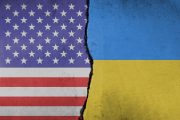Veteran U.S. diplomat Robert A. Wood, Chargé d’Affaires of the U.S. Mission to the IAEA (International Atomic Energy Agency) in Vienna, Austria, issued a statement to the IAEA Board of Governors on November 29, asking IAEA Director-General Yukiya Amano to note in his next quarterly report whether Tehran has taken “any substantive steps” to address the international agency’s warnings. Amano’s next report is expected in late February.
“If by March Iran has not begun substantive cooperation with the IAEA, the United States will work with other board members to pursue appropriate board action, and would urge the board to consider reporting this lack of progress to the U.N. Security Council,” Wood said, according to a copy of his statement quoted by Reuters news.
Though Wood did not specify what “appropriate board action” would entail, it is presumed that it might include increased sanctions against Iran.
“Iran cannot be allowed to indefinitely ignore its obligations…. Iran must act now, in substance,” Wood stated, asserting that Iran “has provocatively snubbed the international community by expanding its enrichment capacity in defiance of multiple United Nations Security Council resolutions.”
A report from VOA News said that IAEA chief Amano met with the agency’s governing board Thursday in Vienna, during which he accused Iran of failing to provide the agency with any credible assurances that its nuclear enrichment activities are peaceful. Amano raised concerns about what he described as “extensive activities” at Iran’s Parchin military facility located southeast of Tehran, where the IAEA believes Iran may be conducting nuclear weapons development experiments. IAEA inspectors have been denied access to the facility.
Amano called on all sides to work “with a sense of urgency and seize the opportunity for a diplomatic solution.”
The UN has already imposed four rounds of sanctions on Iran for failing to comply with UN-affiliated international agencies’ demands regarding its nuclear activities.
Iran’s ambassador to the IAEA, Ali Asghar Soltanieh, also spoke to the agency on Friday, insisting that Tehran’s nuclear activities were being conducted for peaceful purposes, that the six resolutions on Iran passed by the UN Security Council were “illegal,” and that Iran would “never suspend” its uranium enrichment program.
A report from AFP noted that Soltanieh read out a list of the “50 most relevant questions” about Tehran’s nuclear activities and 50 answers that he said indicated that the agency’s file “has to be closed immediately.”
Soltanieh also said that in the event of military action, Iran may place its uranium enrichment equipment “in more secure places” and would withdraw from the nuclear Non-Proliferation Treaty.
AFP cited an unnamed Western diplomat who attended the closed-door meeting of the IAEA’s 35-member board of governors, who called Soltanieh’s claims “absolutely ridiculous” and said that the Iranian ambassador “did not address any of the issues that have been expressed in the board. It is very clear that the Iranians are not serious. I am very pessimistic.”
A report from Iran’s semi-official Fars News Agency cited IAEA chief Amano’s statement during Thursday’s board of governors meeting calling for a diplomatic solution to the controversy surrounding Iran’s nuclear program. “There is an opportunity to resolve the Iranian nuclear issue diplomatically. Now is the time for all of us to work with a sense of urgency and seize the opportunity for a diplomatic solution,” said Amano.
The Fars report noted that earlier this month, Amano said that Tehran had declared its nuclear materials to the IAEA, quoting from a statement the IAEA head made after meeting with French President François Hollande in Paris. “The declared material and installation facilities of Iran are under the IAEA safeguards and we can verify that they stay in a peaceful purpose,” said Amano.
Writers for this publication have consistently tried to present a realistic description of what Iran’s uranium enrichment program consists of, and the likelihood of such a program being used to produce weapons-grade material. For example, in an article published online last February 27, “U.S. Intelligence: No Evidence Iran Building Nukes,” The New American’s foreign correspondent Alex Newman cited a New York Times report published the previous weekend indicating that “the consensus view of the U.S. intelligence community since at least 2007 has been that the Islamic Republic stopped seeking to build nuclear bombs almost a decade ago. And that remains the predominant assessment today.”
The report quoted U.S. Director of National Intelligence James Clapper’s statement to the Senate Select Committee on Intelligence in late January: “[The Iranians] are certainly moving on that path, but we don’t believe they have actually made the decision to go ahead with a nuclear weapon.”
Newman reminded readers of a very important fact that this writer has also often noted in articles on the subject:
Of course, it is widely known that Iran is enriching uranium. The regime boasts about it. But nuclear missiles and weapons-grade material require enrichment of around 90 percent — a long way away from the less-than-20-percent purity the Iranian government is known to be working on.
As noted previously, the United States and other Western nations have already imposed stringent sanctions against Iran. A Wikipedia report notes that in June 2005, President George W. Bush issued Executive Order 13382 freezing the assets of individuals involved with Iran’s nuclear program. Then on June 24, 2010, the U.S. Senate and House passed the Comprehensive Iran Sanctions, Accountability, and Divestment Act of 2010 (CISADA), greatly increasing sanctions against Iran, which President Obama signed into law July 1, 2010 and subsequently issued several executive orders to implement these sanctions.
As we write, news has just been released that the Senate has voted, 94-0, to add new sanctions on trade with Iran’s energy, port, shipping, and ship-building sectors as part of an annual defense policy bill. The sanctions language was included in an amendment co-authored by Sens. Robert Menendez (D-N.J.), Mark Kirk (R-Ill.), and Joseph Lieberman, (I-Conn.)
“We must be clear to the Iranians that toughing it out and waiting it out is not an option, that it will only get worse,” said Menendez.
In reviewing a roll call of the vote (S. Amdt. 3232 to S. 3254 [National Defense Authorization Act for Fiscal Year 2013]), we observed that among those voting “Yea” was Kentucky Senator Rand Paul, the son of former GOP presidential candidate, Rep. Ron Paul of Texas.
This is very curious, since the elder Paul, who will retire from the House at the end of the current session, has been a steadfast opponent of such sanctions. While campaigning in Iowa last December, for example, Rep. Paul told an audience that sanctions against Iran are “acts of war” that are likely to lead to an actual war.
“I think the solution is to do a lot less a lot sooner, and mind our own business, and we wouldn’t have this threat of another war,” Paul said during that speech.
During an appearance on Fox News Sunday in November 2011, when asked what the United States should do to persuade Iran not to pursue a nuclear weapons capability, Paul replied, “Well, maybe offering friendship to them. I mean, didn’t we talk to the Soviets? Didn’t we talk to the Chinese? They had thousands of these weapons.”
The elder Paul also dismissed the belief held by many Americans that Iran is a threat to our interests. “The Iranians can’t even make enough gasoline for themselves,” he said. “For them to be a threat to us or to anybody in the region, I think it’s just blown out of proportion.”
Paul reminded listeners of the sanctions imposed against Iraq under Saddam Hussein, and repeated his opposition to imposing sanctions against Iran. “When you put on strong sanctions, those are acts of war because we did that in Iraq for ten years, and little kids died, couldn’t get medicines and food. It led to war,” he said. “So, I would say treat [the Iranians] differently and it’d be less threatening.”




